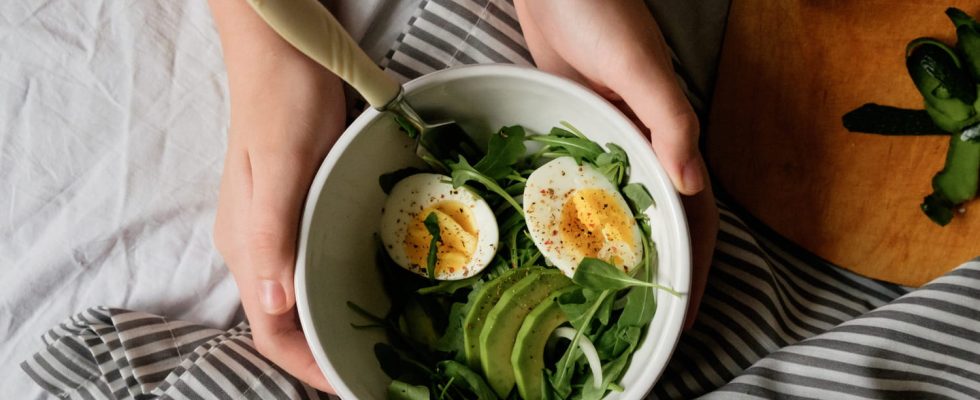The ketogenic or keto diet eliminates sugars and instead focuses on proteins and fats.
Renowned for its health (and slimming) benefits, the ketogenic or “keto” diet is a mode of eating in which are excluded or greatly reduced foods containing carbohydrates (sugars), for the benefit of greater consumption of proteins and lipids. So, instead of drawing energy from sugars, the body draws it from fats. THE lipids become the main fuel of cells.
What foods are allowed on the ketogenic diet?
When you follow a ketogenic diet, you mainly eat foods high in fat and protein such as:
- Vegetable oils (olive, macadamia, coconut, walnut, flax, etc.)
- Butter or ghee (clarified butter)
- Goose and duck fat
- Meat (ideally organic and quality)
- Fish (salmon, trout, mackerel, etc.)
- Eggs
- Oilseeds (almonds, walnuts, etc.)
- Cheese
- The fresh cream
- Fat yogurts
- Vegetables low in carbohydrates (we avoid pumpkin)
- Fruits low in carbohydrates (see below)
It’s important to drink at least 1.5 liters of water per day because the ketogenic diet lowers insulin levels so the body retains less fluids. You can drink water, green tea, coffee, lemon juice, infusions, chicory, broths…
What foods are prohibited on the ketogenic diet?
Carbohydrate foods like:
- THE sugars including stevia, coconut sugar, whole cane sugar, honey
- Sweet products (cakes, pastries, candies, etc.)
- Fruits that contain more than 7g of carbohydrates per 100gthat is to say the majority of them (mango, banana, cherry…)
- THE starchy foods (potatoes, sweet potatoes, other starchy tubers, pasta, rice, legumes and other cereals and their derivatives (semolina, flour, foods they make),
- THE bread in all its forms
- THE light dairy products
- The alcohol
- Dried vegetables except soya, lupine, peanuts
- The pumpkin
What meats can we eat?
All meats are allowed in the ketogenic diet: beef, lamb, poultry, chicken, turkey, ham… The quantity is however determined according to the weight and nutritional status of the person. It is advisable to choose good quality meat, raised outdoors.
What fruits can you eat?
Almost all fruits are excluded because they are high in carbohydrates. Only those which contain less than 7 grams of carbohydrates/100 g are allowed. According to Magali Walkowicz, dietician-nutritionist, you can eat:
- 50g red berries (pomegranate, blackcurrant, etc.),
- lime or yellow lemon,
- there rhubarb,
- currant
- the lawyer
- a small apricot,
- a small plum,
- a small passion fruit,
- 50g papaya,
- starfruit,
- prickly pear
- oilseed fruits such as nut (rich in good fats)
- dried fruits (grapes, dates) but in very small quantities (around 10g)
What vegetables can you eat?
All vegetables (except pumpkin) fresh are authorized, but being sources of carbohydrates, their quantity is rigorously controlled. On the other hand, all dried vegetables are excluded except soy, lupine, peanuts.
What cheeses can you eat?
Concerning dairy products, the ketogenic diet is essentially based on the consumption of butter, cheese, crème fraîche and full-fat yogurt, depending on tolerance, the advanced state of the cancer and its location. “Dairy products made from goat’s or sheep’s milk should be favored, mascarponeand cheeses likee munster, gouda, camembert, emmental, edam (for their richness in antiangiogenic vitamin K2), which must absolutely be chosen organic”, list our interlocutor. The authorized quantity is to be determined on a case-by-case basis.
What bread can we eat?
Bread is not allowed on the ketogenic diet. From time to time it is possible to eat a slice of “ketogenic bread“, made from flour from linseedcoconut flour, almond flour or psyllium husk.
Thanks to Magali Walkowicz, dietician-nutritionist and author of the book Cancer loves sugar (Editions Thierry Souccar).
